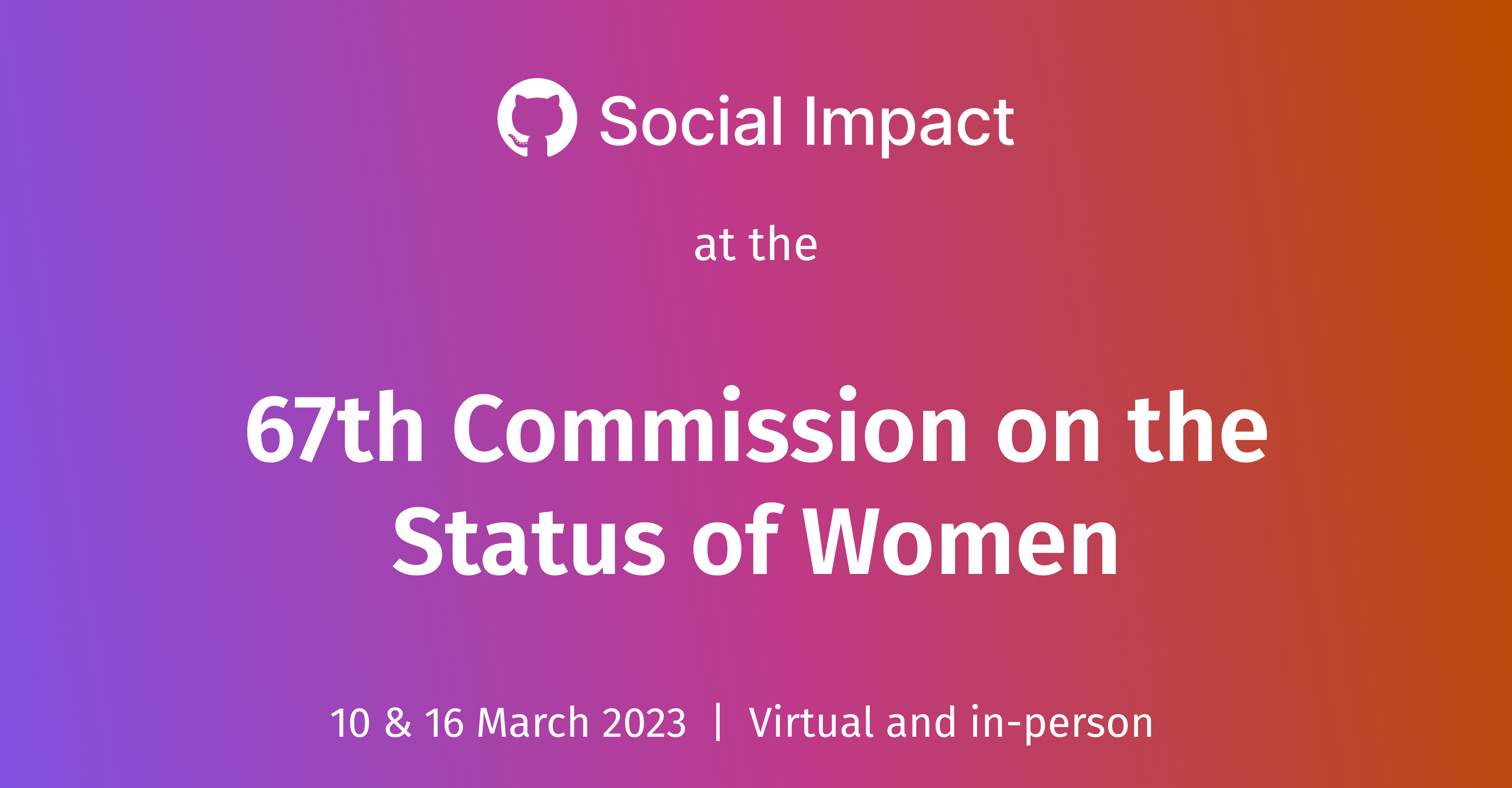At the 67th session of the Commission on the Status of Women (CSW 67), GitHub Social Impact, Tech for Social Good welcomed more than 150 people both in-person in New York City and virtually for two parallel events. Both events aligned with this year’s CSW priority theme of “Innovation and technological change, and education in the digital age for achieving gender equality and the empowerment of all women and girls.” These were the first CSW67 parallel events GitHub has hosted. Below are the event recaps.
Centering Women’s Equity in Digital Technology
Watch the full event recording here
Shelley McKinley, Vice President at Microsoft and Chief Legal Officer of GitHub, delivered the keynote address on the role of AI in gender equity. She emphasized how interwoven AI has already become in modern digital technology tools, and why the full participation of women at every stage of AI development is critical. During a conversation with the keynote speaker, she and Mala discussed how AI may usher in a new era of software development, where creativity and clearly articulating thoughts may become more important than syntax, which may favor women and girls in tech.
I hope to be able to stand in front of you all in a few years and say that the most powerful and the most common language for computer programming is English…it’s French, or Spanish, it’s whatever natural language you wish to code in.”
~ Shelley McKinley
During panel 1, Stephanie Coker, Senior Consultant at TCC Group and Content Lead of The MERL Center, outlined the state of global gender equality in terms of digital technology access, use, and leadership. She explained 62% of boys and men globally are connected online, compared to 57% of girls and women.
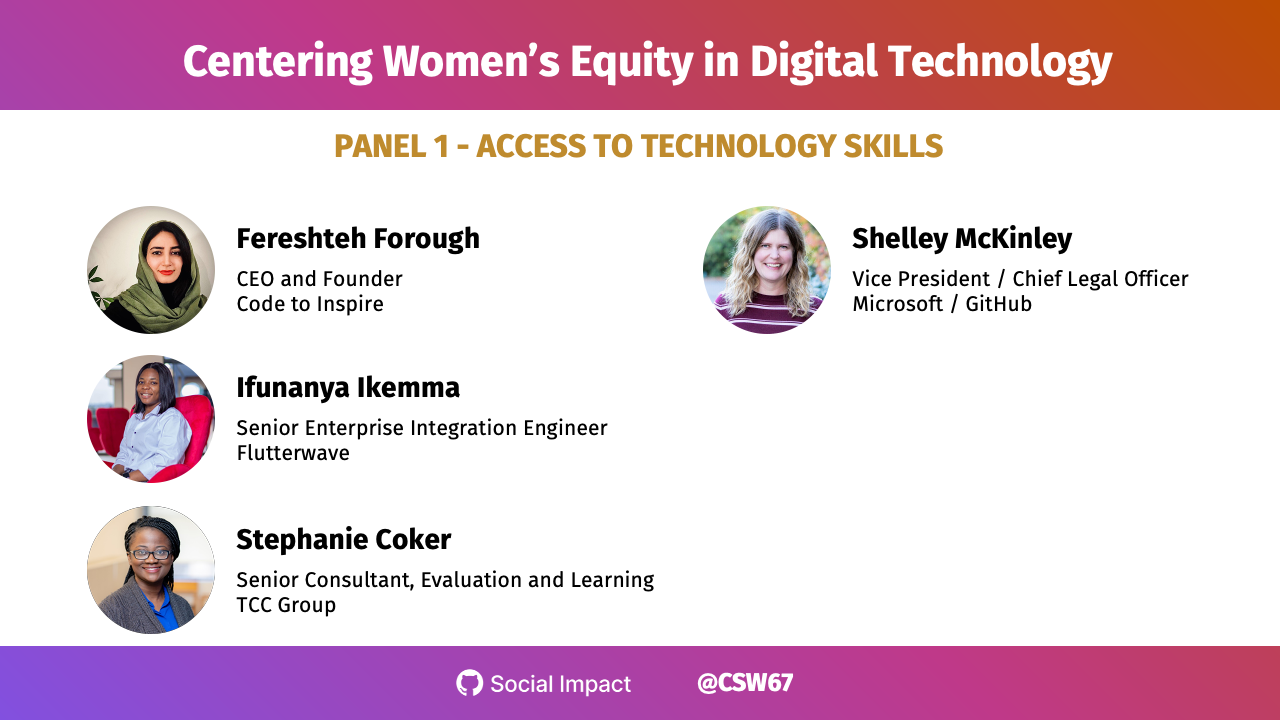
Fereshteh Forough, founder of Code to Inspire, then spoke about her experience being born as a refugee in Iran, raised in Afghanistan, and educated in computer science in Afghanistan and Germany. This led her to found Code to Inspire to help Afghan women learn and develop critical technology skills. Ifnunaya Ikemma, Senior Enterprise Integration Engineer at Flutterwave, and a founder of Hyperspace Africa, then detailed her experience as a female software engineer in Nigeria, and what Hyperspace is doing to connect young women across multiple industries to tech.
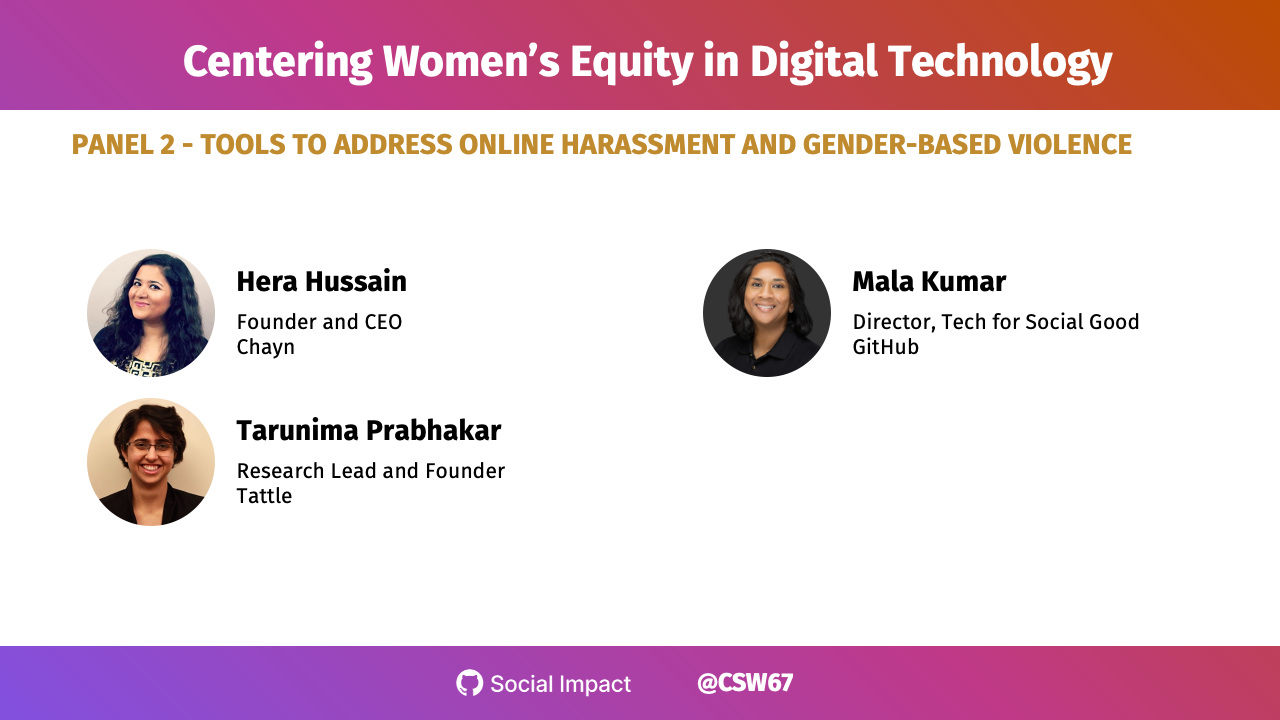
In Panel 2, Hera Hussain, Founder of Chayn, spoke about how her organization has centered their content building, documentation, and software development around trauma-informed practices. She noted that everything Chayn has built is led and designed with multiple perspectives of victims of gender-based violence, for victims of gender-based violence. Tarunima Prabhakar, Co-founder and Research Lead of Tattle, then spoke about Uli, a browser extension tool Tattle has created to help people of marginalized genders combat online harassment and bullying. She explained the process to co-create a machine learning model that takes complex feedback into account from activists and users.
It took us almost nine months to come up with the rubric for annotation for the machine learning model. What the activists thought was abuse…was very different than how a computer scientist would think of abuse.”
~ Tarunima Prabhakar
Following the panels, we announced the new GitHub Tech for Social Good initiative, “Activating Developers,” which aims to empower 50,000 more GitHub users to contribute to social good projects.
Apply to the Digital Public Goods Open Source Community Manager Program
The first program under Activating Developers is the Digital Public Goods Open Source Community Manager Program which will pair one community manager with each of seven current or planned digital public goods. Applications are open until April 10, 2023
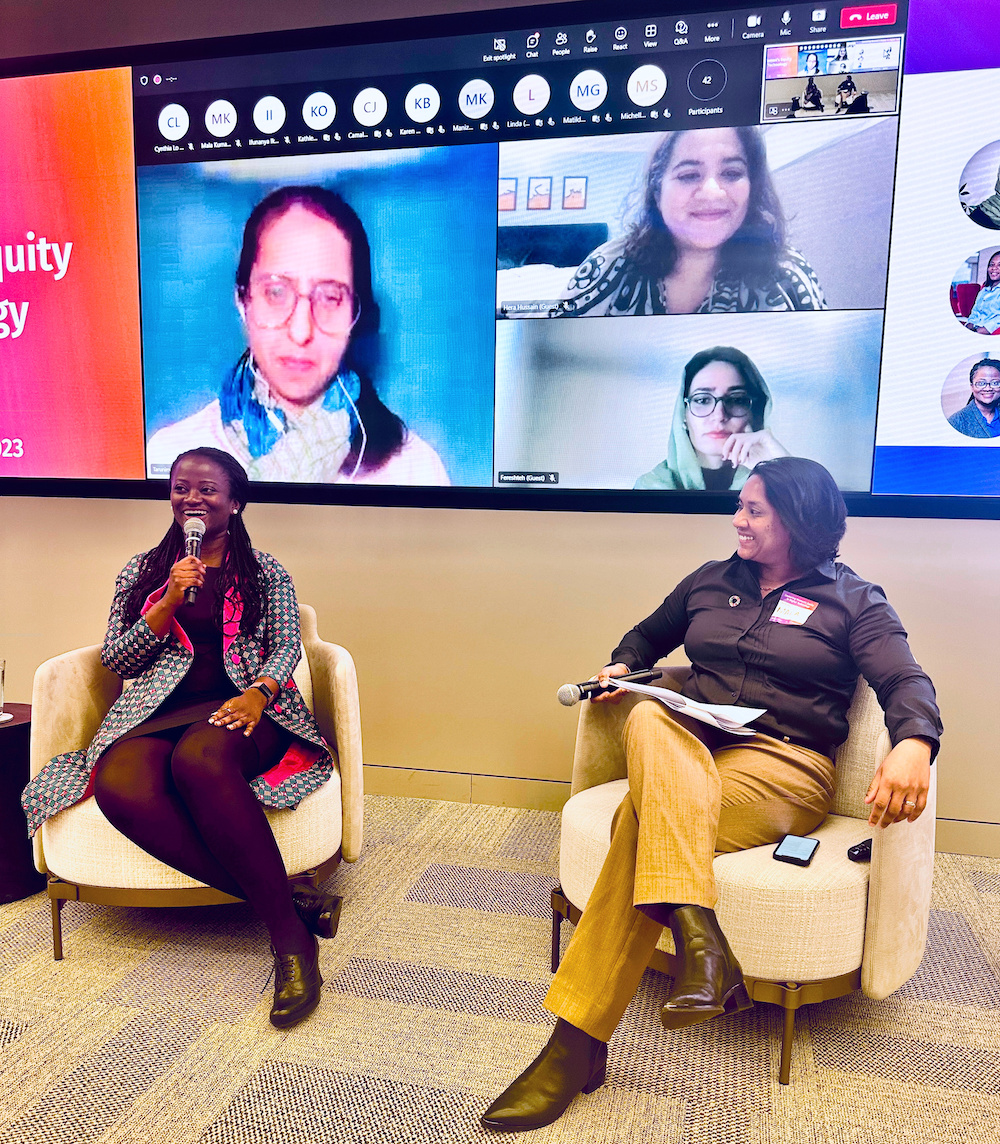
Lastly, in the panelist Q&A, audience members asked about ESG standards, measuring success in gender equality, and the role of open source communities. In response, Fereshteh spoke about infrastructure challenges in Afghanistan, Stephanie spoke about the need for disaggregated data, and Ifnunya explained the importance of strict codes of conduct in Nigeria. Hera then talked about how Chayn has built a large and sustainable open source community, but they have not figured out how to help others repurpose (fork) their tools. Tarunima added that open source means something specific to technologists, but nonprofits in India are not generally motivated to use a tool strictly because it is open source.
GitHub Tech for Social Good would again like to thank everyone who participated and attended Centering Women’s Equity in Digital Technology! The event was a great success thanks to your engagement.
Parallel Event 2: Women in Open Source in Life Science
Watch the full event recording here
Cynthia started the session with a round of panelist introductions, after which Paz explained Open Life Science (OLS)’s model of mentoring and training for its diverse life sciences cohorts. She and Jilaga then detailed challenges women face in open source in life sciences. Gemma, a former OLS cohort member, spoke about being the founder of Ersilia, and its work using AI for drug discovery in global health. Ersilia works with interns in Colombia, Nigeria, India, and Pakistan.
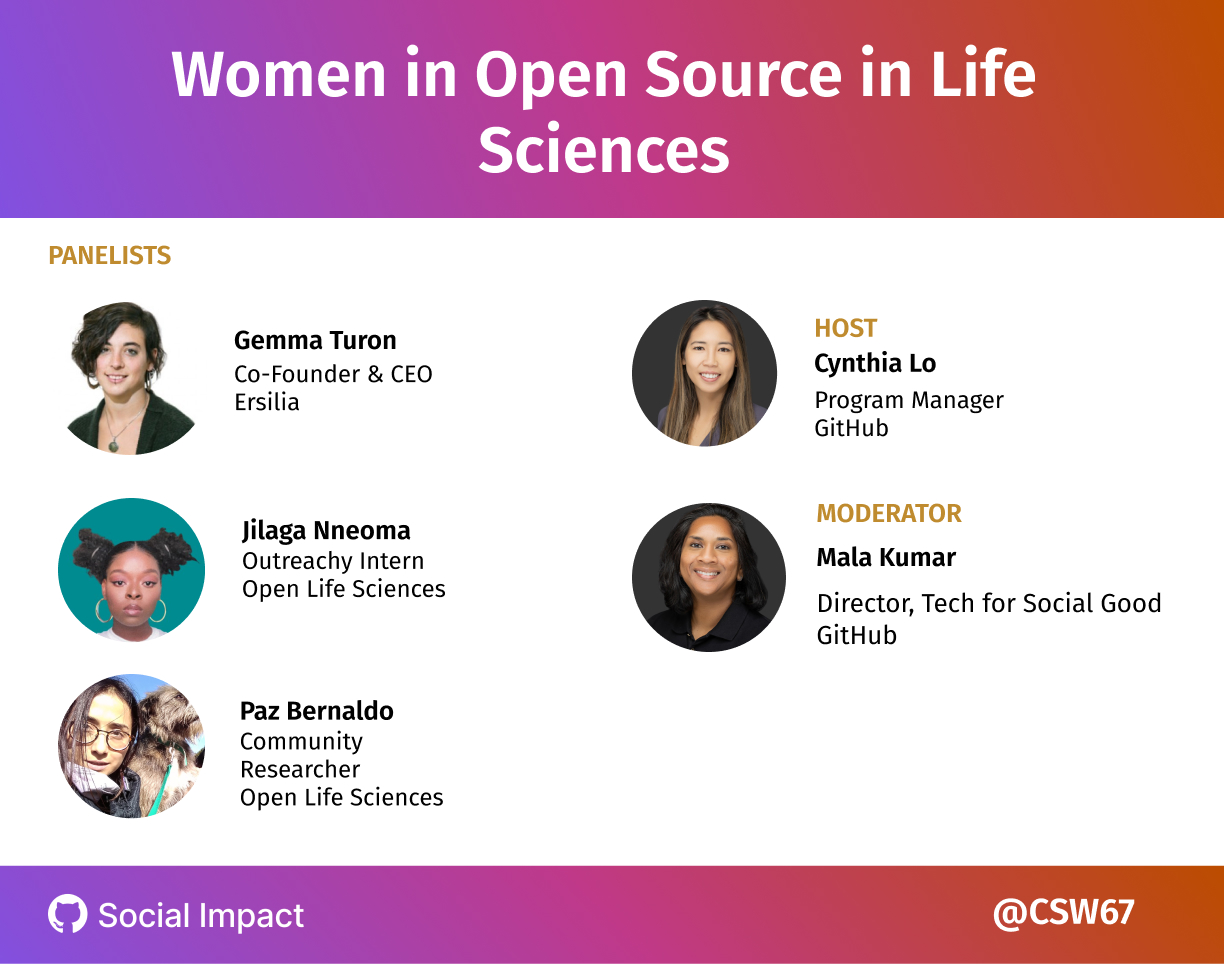
Gemma also spoke about an Ersilia machine learning project that GitHub staff have worked on through Skills-Based Volunteering. Learn more about the project in the MozFest 2023 session recording.
Mala then facilitated the panelist Q&A. The first question asked was about the importance of field work in life sciences, and how unsafe environments for women can negatively impact their careers. Another audience member then asked about grassroot initiatives that could be done to encourage young women and girls to stay in open and life sciences. These questions have led to an informative discussion, and audience members were invited to join OLS to learn more.
Thank you again for attending Women in Open Source in Life Science!
